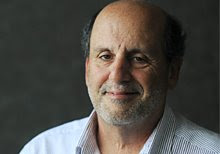How will we know when we've hit bottom?
The short answer: We won't.
The National Bureau of Economic Research - the keepers of business cycle dating - usually doesn't call the date on recessions beginning or hitting bottom until months after we get there. That's fine for historians; not so much for our hunger for optimism.
Instead, we are left with speculation from analysts and economists, who will be back at it today with the weekly jobs report - a critical indicator of our economic health - that showed 627,000 new unemployment claims, same as last week but worse than expected.
(UPDATE: The New York-based Conference Board said moments ago that its January index of leading economic indicators rose 0.4 percent, the second straight monthly gain. Economists surveyed by Thomson Reuters expected no change in the index, which forecasts economic activity for the next three to six months based on 10 economic components. Conference Board economist Ken Goldstein says the “intensity” of the recession could begin to ease in the next few months.)
Some analysts have speculated that a bottom might be approaching soon, perhaps in the late spring or summer. Their reasoning? While we're still getting little but bad news, it hasn't been as bad as the news that preceded it. A warning, however: Economists were saying the same thing last spring, and last fall.
(Or not saying much at all. In one of the few viral economic videos out there, here's former Treasury Secretary Henry Paulson, at a November conference, attempting to answer the bottom question.)
The Fed, in the midst of somber manufacturing and housing reports yesterday, said the economy will continue to contract through 2009. But the government, too, has been regularly missing the dartboard in the past 18 months.
Among the clues the bottom has arrived - or that we landed recently - is a leveling off of jobs losses and housing indicators, as well as an increase in energy prices as Americans start to consume more.
We checked in with our economics expert, UNCC's John Connaughton, who was wise enough not to make a prediction but said he was encouraged that January retail sales were up slightly over December.
"All major categories were up compared to the December levels," he said. "Bottom line, consumers are beginning to buy, and if they can get credit they may also begin to buy autos. The ball is now in the Feds hands as the consumer has indicated they are ready to buy. The question now is can the Fed get credit to the average buyer?"
Your Morning Edge:
Have bailout fatigue? George Will does.
The housing rescue plan also has left the uninvited angry, the Wall Street Journal reports.
From Slate: Why Obama's foreclosure plan will be harder to accomplish than it sounds.
Thursday, February 19, 2009
The elusive bottom
Subscribe to:
Post Comments (Atom)





7 comments:
This is one of the problems the media does relying on academias so called experts who live in the idealistic world built and paid for by taxpayers instead of using experts in the field who deal with the real world.
More spending? Hold on a sec. The average credit card is maxed out at 20% interest rates plus mortages are thru the roof with car payments college bills etc etc and you want spending? This was what got this nation into the terrible fix its in including overspending by the fed and its printed money non gold standard. America must return to the basics. Pay as you go. No credit cards. Use cash only otherwise dont buy. Reduce your standard of living
50%. Real estate values must stay low and go lower.
Those who cant pay their mortgage get out of the home and rent. Banks will never loan again to risky buyers. Those days are over. America will return to 2nd world.
1st world is out. We will only go to 3rd world only if a terminal Depression occurs.
1929 was 3rd world.
Well somebody needs to inform all tax offices that America is in a great depression because they pretend everything is still hunky dory and continue to raise your property values to pay more taxes that is clearly fraudulently corrupt but then again tax collectors have always been rated lower than hell itself. Beware of the bandit tax criminals.
Another problem we have is people get on blogs anonymously and act like there the expert. If your know so much about the econonmy and we are about to enter the "3rd World or 2nd world" as you predict, why couldnt you put your name so we knew who were getting the great economic information from. Because your just another know it all who sits behind his desk and acts like he knows the answer to this whole mess, but still can only provide cristism and no ideas at all. Sounds like a of the congreessmen around the country.
Thanks for something positive in the sea of negativity out there.
I pretty much don't watch the news anymore, because all they report is murders or these days, layoffs.
Dream on;the END is nowhere in sight.
http://www.eastvalleytribune.com/story/135640
Who are these economist? Everyting I have read says, all of 2009 is going to be bad and 2010 will not be much better. As a company and an individual we should be planning that way. Expect the worse and make the changes now to insure you can weather the storm. If it gets better faster, thing of how you will positioned to take advantage of the recovery
Post a Comment